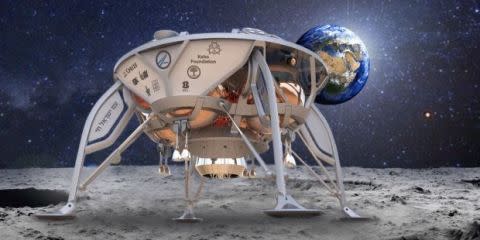This Startup Is Trying to Reach the Moon Without Help from Any Governments

Google’s lunar moonshot contest may be dead, but that’s not stopping one company from trying to complete the goal anyway. Google’s contest sought to award the first private company that could land a craft on the moon, and ended in 2018 without a winner. One of the participants, the Israeli aerospace company SpaceIL, announced on Monday that it’s still working on that goal and will attempt a landing in April.
SpaceIL CEO Ido Ateby announced his company's spacecrafts schedule at a press conference on Monday. According to Anteby, the spacecraft carrying SpaceIL’s lander will launch late Thursday night. Once in space, the lander will orbit the Earth about six times to build up speed before heading toward the moon a week later. The lander should land on the surface on April 11.
SpaceIL has contracted Elon Musk’s SpaceX to ferry the lander into orbit. The lander, named ‘Beresheet’ after the first book of the Torah, will ride in a Falcon 9 rocket along with an Indonesian communication satellite and an experimental Air Force mini-satellite.
If SpaceIL is successful, it will become the first private company in history to land a spacecraft on the moon. Beresheet is equipped with a handful of scientific instruments, such as a magnetometer for measuring the moon’s magnetic field, as well as a retroreflector that scientists on Earth can bounce laser beams off, to measure the distance from the Earth to the moon.
These aren’t particularly advanced scientific instruments, but the scientific discoveries Beresheet will make are secondary to the achievement of reaching the lunar surface at all. Beresheet is proving a point: that it’s possible for a private company or organization to build a lander and get it to the moon using a rocket built by another private company. No longer is moon exploration solely the domain of a handful of wealthy governments; as SpaceIL hopes to prove anyone can land a spacecraft on the moon. Any scientific breakthroughs beyond that are just icing on the cake.
Source: Time
('You Might Also Like',)
